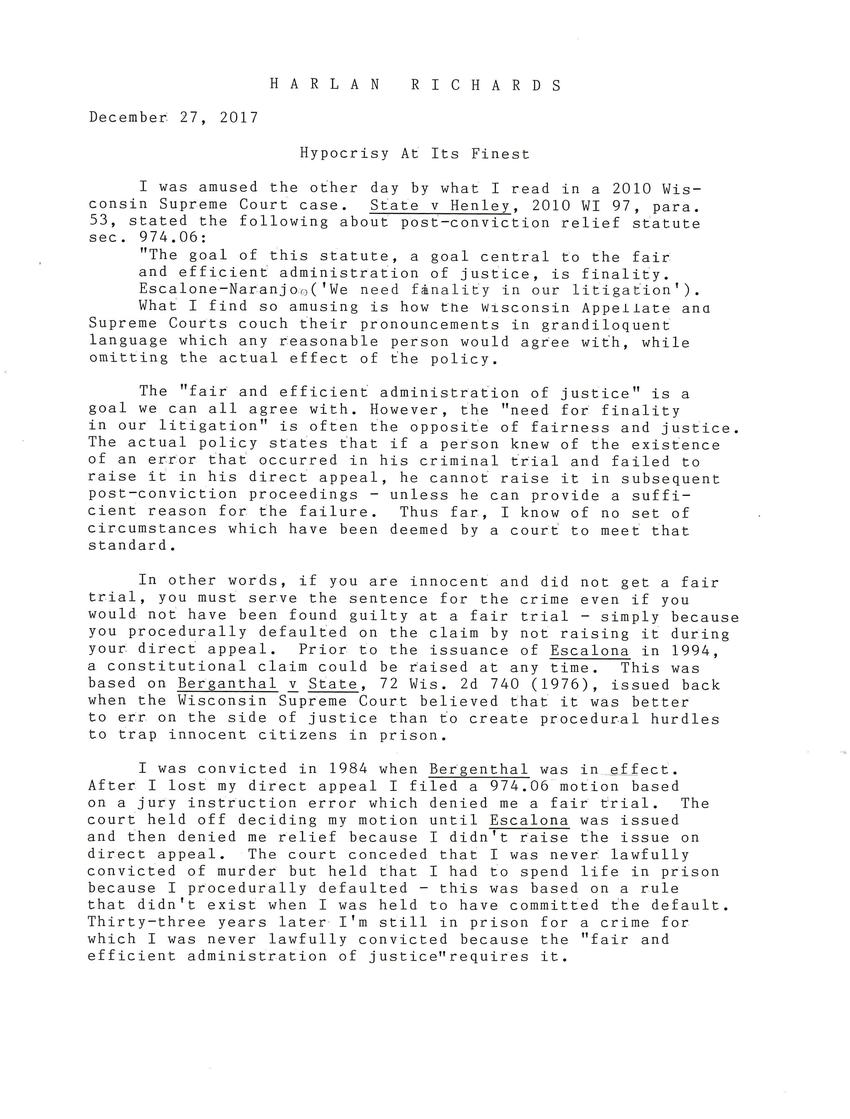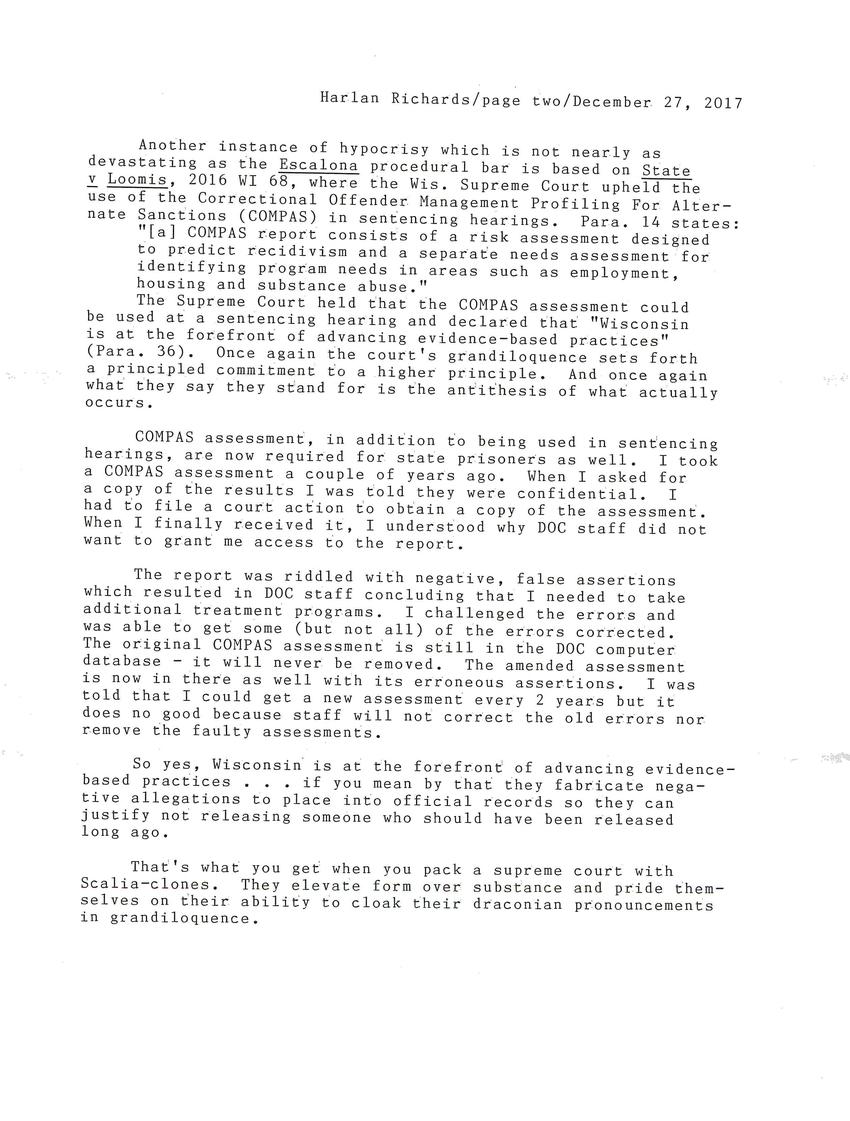
Transcription
HARLAN RICHARDS
December 27, 2017
Hypocrisy at Its Finest
I was amused the other day by what I read in a 2010 Wisconsin Supreme Court Case. State v. Henley, 2010 WI 97, para. 53, stated the following about post-conviction relief statute sec. 974.06:
"The goal of this statute, a goal central to the fair and efficient administration of justice is finality. Escalone-Naranjo ('We need finality in our litigation')."
What I find so amusing is how the Wisconsin Appellate and Supreme Court couch their pronouncements in grandiloquent language which any reasonable person would agree with, while omitting the actual effect of the policy.
The "fair and efficient administration of justice" is a goal we can all agree with. However, the "need for finality in our litigation" is often the opposite of fairness and justice. The actual policy states that if a person knew of the existence of an error that occurred in his criminal trial and failed to raise it in his direct appeal, he cannot raise it in subsequent post-conviction proceedings—unless he can provide a sufficient reason for the failure. Thus far, I know of no set of circumstances which have been deemed by a court to meet that standard.
In other words, if you are innocent and did not get a fair trial, you must serve the sentence for the crime even if you would not have been found guilty at a fair trial—simply because you procedurally defaulted on the claim by not raising it during your direct appeal. Prior to the insurance of Escalona in 1994. a constitutional claim could be raised at any time. This was based on Berganthal v. State, 72 Wis. 2d 740 (1976), issued back when the Wisconsin Supreme Court believed that it was better to err on the side of justice than to create procedural hurdles to trap innocent citizens in prison.
I was convicted in 1984 when Bergenthal was in effect. After I lost my direct appeal, I filed a 974.06 motion based on a jury instruction error which denied me a fair trial. The court held off deciding my motion until Escalona was issued and then denied me relief because I didn't raise the issue on direct appeal. The court conceded that I was never lawfully convicted of murder but held that I had to spend life in prison because I procedurally defaulted—this was based on a rule that didn't exist when I was held to have committed the default. Thirty-three years later, I'm still in prison for a crime which I was never lawfully convicted because the "fair and efficient administration of justice" requires it.
Another instance of hypocrisy which is not nearly as devastating as the Escalona procedural bar is based on State v. Loomis, 2016 WI 68, where the Wisconsin Supreme Court upheld the use of Correctional Officer Management Profiling for Alternate Sanctions (COMPAS) in sentencing hearings. Para. 14 states:
"[a] COMPAS report consists of a risk assessment designed to predict recidivism and a separate needs assessment for identifying program needs in areas such as employment, housing, and substance abuse."
The Supreme Court held that the COMPAS assessment could be used at a sentencing hearing and declared that "Wisconsin is at the forefront of advancing evidence-based practices" (Para. 36). Once again, the court's grandiloquence sets forth a principled commitment to a higher principle. And once again, what they say they stand for is the antithesis of what actually occurs.
COMPAS assessment, in addition to being used in sentencing hearings, are now required for state prisoners as well. I took a COMPAS assessment a couple of years ago. When I asked for a copy of the results I was told they were confidential. I had to file a court action to obtain a copy of the assessment. When I finally received it, I understood why DOC staff did not want to grant me access to the report.
The report was riddled with negative, false assertions which resulted in DOC staff concluding that I needed to take additional treatment programs. I challenged the errors and was able to get some (but not all) of the errors corrected. The original COMPAS assessment is still in the DOC computer database—it will never be removed. The amended assessment is now in there as well with its erroneous assertions. I was told that I could get a new assessment every two years, but it does no good because staff will not correct the old errors nor remove the faculty assessments.
So yes, Wisconsin is at the forefront of advancing evidence-based practices... if you mean by that they fabricate negative allegations to place into official records so they can justify not releasing someone who should have been released long ago.
That's what you get when you pack a Supreme Court with Scalia-clones. They elevate form over substance and pride themselves on their ability to cloak their draconian pronouncements in grandiloquence.
Other posts by this author
|
2021 jun 25

|
2021 may 25

|
2021 apr 23

|
2021 feb 19

|
2021 feb 17

|
2021 feb 15

|
More... |



Replies